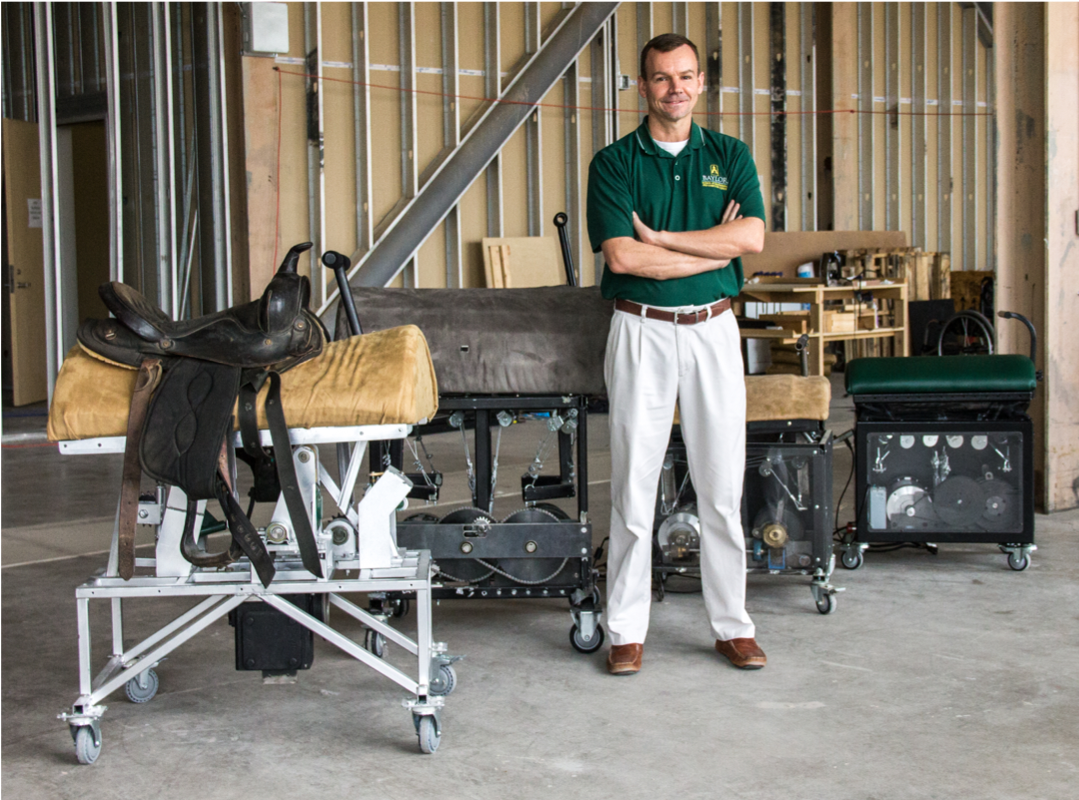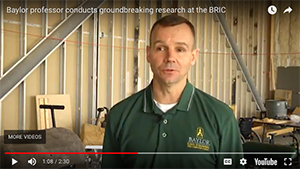New Start-up Company Markets Baylor Engineering Professor's Innovative Hippotherapy System


Designed by Baylor Assistant Professor of Mechanical Engineering Dr. Brian Garner, Baylor has patented a therapeutic system that precisely simulates the complex motions of a horse's walking gait.
Contact: Whitney Richter, Director of Marketing and Communications, Office of the Vice Provost for Research, 254-710-7539
Written by: Gary Stokes, Office of the Vice Provost for Research
WACO, Texas (February 16, 2018) – A decade ago, Baylor Associate Professor of Mechanical Engineering Brian Garner had never even heard of hippotherapy — the use of horseback riding as a therapeutic treatment for a variety of conditions. Now he and a group of investors have created Chariot Innovations to promote his patented device that faithfully reproduces the equine motion pattern that has proven so effective in treating autism, Down’s Syndrome, PTSD, multiple sclerosis, stroke, Parkinson’s Disease and numerous other debilitating conditions. The research, development and commercialization efforts of this start-up technology are taking place within the Baylor Research and Innovation Collaborative.
Click here to view a video on Dr. Garner's research from the Baylor Lariat.
Honed and refined over nine years through four developmental generations (shown in photo), Garner’s device promises to give patients better access to the life-changing rhythms of a horse’s gait. But Garner is quick to point out that his invention is not intended to replace the horse but to simulate the movement of the horse when the use of an animal is impractical. “The intent was not to replace the role of the horse, but to provide a complementary tool that would make these motion patterns more accessible,” he said. “This is something that could be inside [and] wouldn’t depend on the weather. Sometimes a child has allergies, a fear of the animal, or maybe the person’s condition is so severe it’s not safe to put them up on the animal. The idea was, here’s something that you can use, that’s compact, low to the ground, safe, and the therapist … can be all around, [continuously interacting with] the patient. It’s just some way a mechanical device could be complementary to actual riding.”
Carl Webb, a recent Baylor graduate in entrepreneurship, serves as Chariot Innovations’ chief operating officer. After receiving his diploma., he found the company to be exactly the opportunity he was seeking. “I’d been looking for something like a company that I could help start and remain engaged [at Baylor] … I’ve been working to actively bring this device, this new treatment, to market,” Webb said. “Mostly we’ve been reaching out to [clinics] … calling people up and going to visit them and showing them the equipment, seeing what they think, asking them a bunch of questions, figuring out how it can fit in.”
Webb considers hippotherapy and the device as taking advantage of natural healing mechanisms that are often overlooked. “One of the things we are learning is … that our body and our whole biology … has capabilities to rehabilitate itself. That’s how we’re made. There may not be a pill, or other fix, and we can often rely on motion and the natural things we're given to heal.” “The technology that Dr. Garner has developed is an excellent example of how research here at Baylor focused on Christian values can turn into a device or product that has a direct and positive impact on people and society.”
Dr. Dennis O’Neal, Dean of Baylor’s School of Engineering and Computer Science, is enthusiastic about Garner’s new treatment innovation. “The technology that Dr. Garner has developed is an excellent example of how research here at Baylor focused on Christian values can turn into a device or product that has a direct and positive impact on people and society,” said O’Neal.
Baylor’s Vice Provost for Research, Dr. Truell Hyde, shares O’Neal’s sentiment. “One of the most exciting aspects of my job is the opportunity to work with faculty on real-world applications for their research. At Baylor such opportunities take on added layers of meaning from the university's Christian mission. In Dr. Garner's work, undergraduate- and graduate-level researchers work alongside Baylor faculty at the intersection of scientific research and individual human need. For me, it doesn't get any better than that.”
Already, nearly two dozen of the units have been fielded. Some are supporting research at several Texas universities, but most are being used in clinical settings – physical and equine therapy clinics – and with impressive results.
Garner cited one such example of a clinic where a patient with multiple sclerosis was using the device. “One of the cables [on the unit] stretched out and it became inoperative. She emailed us asking, ‘Can you come quickly to fix this? For years and years and years I’ve tried every kind of therapy and every kind of treatment and this is the first thing that has really made a difference for me. I’m seeing improvement in my walking. I’ve been able to go for walks, and my balance, I can get around my house by myself. If I don’t keep riding I tend to start regressing.’ We were down there the next day.”
Those kinds of testimonials are music to Garner’s ears, as he views development of the device as an expression of his deeply held, faith-driven desire to help people.
“If you want to get down to the vision and mission of Chariot, yes, we want to be a successful company, yes, we want to have a great product, but ultimately … what drives us is the benefit that we can derive for people. We want to help people,” said Garner. “We want to be a blessing to people. We want to help improve their quality of life and give them something that will allow them to achieve these outcomes and improvements and goals they have for their lives.”
